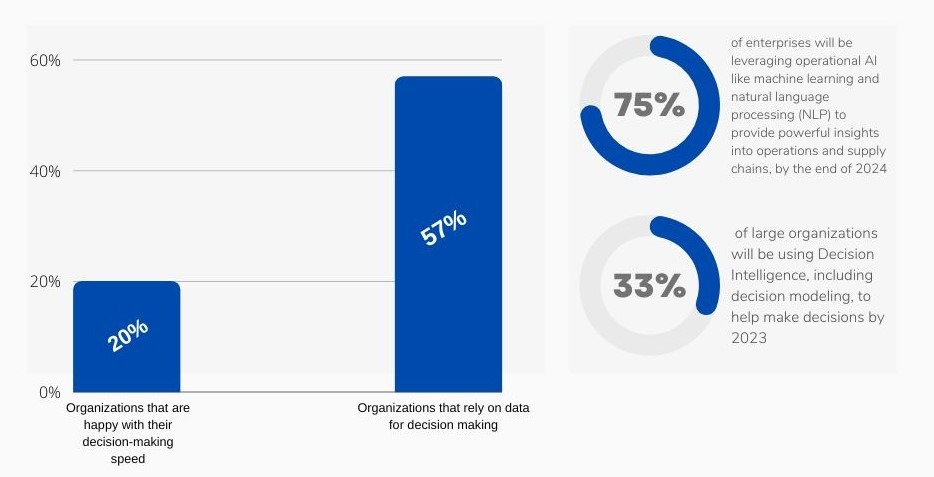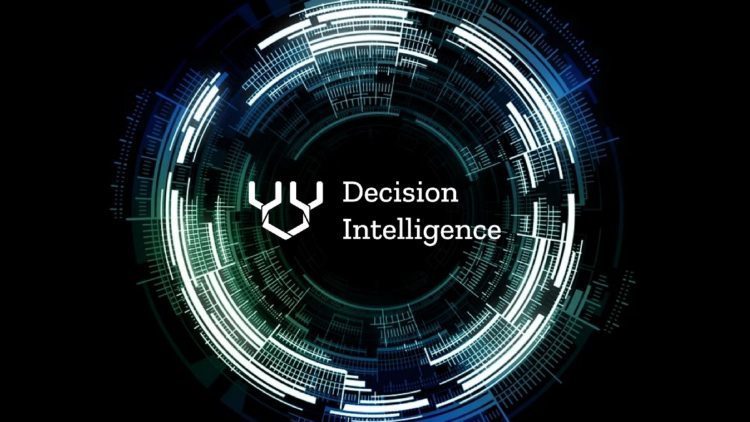Informed and well-timed decisions are the need of the hour for growing businesses today. Organizations must make accurate and highly contextualized decisions quickly in the face of unprecedented levels of business complexity and uncertainty. As businesses face increased pressure to meet targets and maintain success rates, making the right decisions on time has become more and more important.
According to Gartner, by 2023, 33% of large organizations across the world will be practicing data-driven decision intelligence to quickly understand reasons and critical drivers for their business behaviors. With decision intelligence pipped to be the next big data analytics innovation, every modern-day business needs to be aware of it to close the gap between the data and its outcomes.
What is Decision Intelligence?
Decision intelligence is a data-driven approach to make better, faster decisions rather than being reliant on intuition or gut feeling. It uses AI, machine learning, contextual intelligence, and automation to generate actionable and specific business recommendations that can be immediately implemented to deliver commercial value.
Why Is Decision Intelligence Important?
Decision intelligence uses data science to connect business problems and find appropriate solutions. Through data collection and machine learning modeling, you can forecast precise results for optimal business decision-making. Companies have experienced increased profits of 8-10% as a result of data-driven decision-making processes and reduced their overall costs by 10%.

Unlike popular belief, decision intelligence is not about removing humans from the decision-making process; instead, it is all about empowering the people in the organization with AI and accessible data to facilitate them to make the best decision possible. In a study by McKinsey, 72% of executives report that bad decisions are just as common as good ones, and an average S&P 500 company wastes $250 million annually on ineffective decisions.
Therefore, decision intelligence coupled with quality data management can help companies to make better business decisions across all levels of the organization and gain greater visibility into their operations while achieving game-changing commercial outcomes. And, here is where Corestrat can help organizations in making calculated decisions. Using our expertise in data analytics and ability to build intuitive algorithms and models, Corestrat can help your organization make well-informed decisions and gain a competitive edge.
What can Decision Intelligence (DI) do for Your Organization?
Organizations can become more agile, collaborative, and data-driven by implementing decision intelligence. Business leaders who implement predictive analytics are better prepared to react proactively to new challenges. Some of the values that implementing decision intelligence can add to your organization are:
- Quicker and improved decision-making process: Decision-makers can access, analyze, and get insights from data with the aid of DI more quickly.
- Enhanced accuracy: Decision intelligence mitigates the errors and biases that might occur during the traditional decision-making process. The use of AI and ML in the decision-making process allows users to make highly accurate decisions.
- Identifying risks and offering specific advice: Decision intelligence systems can recognize risks and provide detailed guidance on what steps to take to prevent adverse effects on the business.
- Improved team collaboration: Team members can access data from a single location and share findings more readily across teams and departments.
- Reduces dependency on human analytics: It eliminates businesses’ requirement to rely solely on analysts to produce reports and dashboards and offer insights. With DI, even people of non-technical backgrounds can understand the insights and recommendations to make better decisions.
Is Decision Intelligence similar to Business Intelligence?
Decision intelligence and business intelligence are two different terminologies. Business intelligence (BI) refers to historical reporting systems to answer pre-defined questions with traditional query analysis. As it only considers historical data and cannot factor in current data, making predictions about the future becomes difficult. BI provides a dashboard for businesses to analyze and come up with a solution or to improve a process. The decision-maker has to analyze and synthesize information from several dashboards when using BI, which is time-consuming.
On the other hand, decision intelligence is the next evolutionary stage of BI, designed using AI that considers previous and present data for future predictions and recommendations. Unlike BI, decision intelligence may be easily understood even by non-technical members of the business and transformed into insight that can be put into action.
Due to the increasing complexity of data, extracting valuable insights from traditional BI platforms has become overly challenging and ineffective. This is where decision intelligence can help. With the ability to automatically deliver a plan of action in real-time that reduces the distance between data analysis and decision-making, DI can help your organization thrive in today’s highly competitive business world.
Industry-wise application of decision intelligence
Organizations are using decision intelligence systems to automate and expedite decision-making in a number of industries. Here are some sectors that have successfully adopted DI and achieved maximum benefits.
- Supply chain: With the use of decision intelligence, the supply chain sector can fully utilize its data and drive results by enhancing operations like purchasing, pricing, and inventory management.
- Financial services: Financial institutions are using DI to process credit, mortgage, and loan credit applications based on the client’s income, credit score, and other data.
- Marketing: Marketers can quickly identify high-performing efforts across numerous channels, from social media to email, and maximize ROI for each campaign.
- Healthcare sector: DI gives doctors the superpower of knowing what to do and better predicting their prognosis.
- Retail: DI can help optimize inventory, fulfil orders, and manage warehouse space based on demand projections.
- Cybersecurity: Decision Intelligence can help Cybersecurity consulting agencies collect, analyze and identify potential threats to prioritize risk mitigation efforts and enhance security operations.
Conclusion
Despite 91% of companies believing decision intelligence has the potential to positively impact their business, only 57% of companies are actually utilizing it. Decision intelligence is a strategic imperative and capability most modern businesses need today because it is able to predict upcoming scenarios and recommend specific solutions. As an emerging technology toolkit, decision intelligence meets all traditional BI and analytics needs while delivering accessibility, performance, context, scalability, and rich functionality that surpasses legacy tools in many ways.
Please reach out should you be interested in evaluating how Corestrat can support your decision-making process. You can reach us by filling out the contact us form here or emailing us at hello@corestrat.ai
 Skip to content
Skip to content




